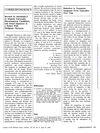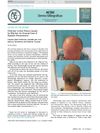 127 citations,
July 1996 in “Journal of The American Academy of Dermatology”
127 citations,
July 1996 in “Journal of The American Academy of Dermatology” Minoxidil shortens baldness from chemotherapy by 50.2 days without significant side effects.
 88 citations,
February 2008 in “Journal of Medicinal Chemistry”
88 citations,
February 2008 in “Journal of Medicinal Chemistry” Scientists made the first metal-based compounds from a nonsteroidal antiandrogen drug, which showed potential in fighting both hormone-dependent and independent prostate cancer cells.
 81 citations,
February 1997 in “Journal of Investigative Dermatology”
81 citations,
February 1997 in “Journal of Investigative Dermatology” Minoxidil boosts hair growth by activating PGHS-1.
 76 citations,
August 2007 in “Supportive care in cancer”
76 citations,
August 2007 in “Supportive care in cancer” Chemotherapy often causes skin, nail, and hair side effects, significantly impacting quality of life.
 43 citations,
June 2012 in “Lasers in Medical Science”
43 citations,
June 2012 in “Lasers in Medical Science” Low-level laser treatment helped rats regrow hair faster after chemotherapy.
 41 citations,
March 2007 in “Journal of dermatological science”
41 citations,
March 2007 in “Journal of dermatological science” Taking L-cystine and vitamin B6 can prevent hair loss caused by smoke in mice.
 24 citations,
November 2013 in “Trends in pharmacological sciences”
24 citations,
November 2013 in “Trends in pharmacological sciences” Increasing ABC transporters in hair follicles may prevent chemotherapy-induced hair loss.
 21 citations,
August 2003 in “Seminars in oncology nursing”
21 citations,
August 2003 in “Seminars in oncology nursing” Nurses are crucial in managing chemotherapy side effects for ovarian cancer patients to improve their quality of life.
 13 citations,
February 2007 in “British Journal of Dermatology”
13 citations,
February 2007 in “British Journal of Dermatology” EF and PXE not closely related.
 10 citations,
January 2015 in “Journal of Cutaneous Medicine and Surgery”
10 citations,
January 2015 in “Journal of Cutaneous Medicine and Surgery” Cold caps and certain drugs may help prevent or reduce hair loss from chemotherapy, but more research is needed.
 9 citations,
February 2019 in “BMC cancer”
9 citations,
February 2019 in “BMC cancer” M30 is a promising treatment for preventing hair loss during chemotherapy.
 9 citations,
January 2014 in “Annals of Dermatology”
9 citations,
January 2014 in “Annals of Dermatology” Some breast cancer patients on hormonal therapy may develop male or female pattern hair loss, which can sometimes be improved with topical treatments.
 9 citations,
April 1993 in “Journal of the National Cancer Institute”
9 citations,
April 1993 in “Journal of the National Cancer Institute” Interleukin-2 treatment improved hair growth, sexual function, and reduced fungal infection in a patient with thymoma-related symptoms.
 4 citations,
January 2012 in “Elsevier eBooks”
4 citations,
January 2012 in “Elsevier eBooks” The document concludes that various skin conditions have specific treatments, ranging from antihistamines for urticaria to surgery and medication for tumors and chronic skin diseases.
 3 citations,
May 2016 in “International Journal of Research in Ayurveda and Pharmacy”
3 citations,
May 2016 in “International Journal of Research in Ayurveda and Pharmacy” Ayurveda, using herbs like ginger, garlic, and turmeric, can reduce chemo-radiotherapy side effects in cancer patients.
 3 citations,
January 2011 in “Wspolczesna Onkologia-Contemporary Oncology”
3 citations,
January 2011 in “Wspolczesna Onkologia-Contemporary Oncology” Scalp hypothermia can prevent chemotherapy-induced hair loss but is not suitable for all patients, and more research is needed to improve prevention methods.
 2 citations,
October 2018 in “Springer eBooks”
2 citations,
October 2018 in “Springer eBooks” Cancer treatments can cause skin-related side effects that may affect patient quality of life and require changes in treatment.
 2 citations,
December 2017 in “Bangladesh Journal of Pharmacology”
2 citations,
December 2017 in “Bangladesh Journal of Pharmacology” Black seed oil significantly protects against hair loss from chemotherapy.
 2 citations,
October 2016
2 citations,
October 2016 Chemotherapy and radiotherapy can cause skin side effects like rashes, hair loss, and nail changes, which are usually managed with conservative treatments.
 2 citations,
March 2015 in “Clinical and Experimental Dermatology”
2 citations,
March 2015 in “Clinical and Experimental Dermatology” Azathioprine can cause unusual hair loss, which may reverse after stopping the drug.
 1 citations,
January 2018 in “Springer eBooks”
1 citations,
January 2018 in “Springer eBooks” The document concludes that scalp cooling and treatments like minoxidil can help manage hair loss from cancer therapy.
 1 citations,
April 2016 in “Actas Dermo-Sifiliográficas”
1 citations,
April 2016 in “Actas Dermo-Sifiliográficas” Wearing a wig caused a woman's skin condition to worsen due to pressure from the wig's fasteners.
 1 citations,
November 1983 in “The Lancet”
1 citations,
November 1983 in “The Lancet” Acute leukemias with the Philadelphia chromosome may be biphenotypic, and identifying this is important for proper treatment.
 November 2022 in “Journal of the Endocrine Society”
November 2022 in “Journal of the Endocrine Society” A man's rare adrenal tumor caused feminization and white hair, was removed surgically, and improved after treatment.
 August 2021 in “Acta Haematologica Polonica”
August 2021 in “Acta Haematologica Polonica” Folliculotropic mycosis fungoides has a worse prognosis than other types, with survival rates varying significantly based on subtype and organ involvement.
 March 2008 in “Aging health”
March 2008 in “Aging health” Docetaxel is safe and works well for older people with cancer, with manageable side effects.
 August 1994 in “Drugs & Therapy Perspectives”
August 1994 in “Drugs & Therapy Perspectives” Some drugs can cause hair loss or growth, but hair usually returns to normal after stopping the drug.
 724 citations,
April 2004 in “Lancet Oncology”
724 citations,
April 2004 in “Lancet Oncology” Chemotherapy in the first trimester of pregnancy is risky, but in the second and third trimesters, it's generally safe with careful drug selection and timing.
 438 citations,
October 2010 in “Oncogene”
438 citations,
October 2010 in “Oncogene” Keratins help protect cells, aid in cancer diagnosis, and influence cancer behavior and treatment.
 310 citations,
November 2011 in “Environment International”
310 citations,
November 2011 in “Environment International” Anticancer drugs are increasingly found in surface waters, and their long-term environmental effects are not well understood, requiring better testing methods.






























